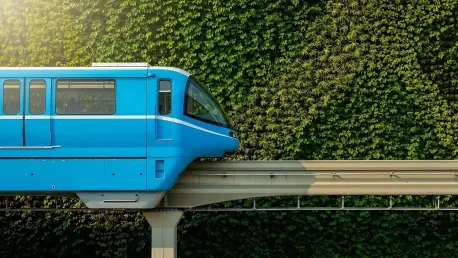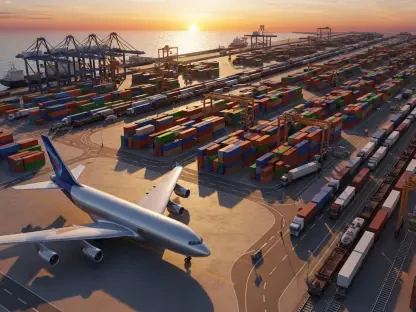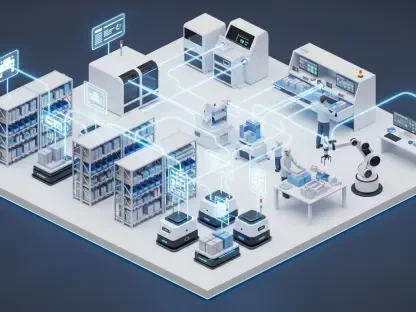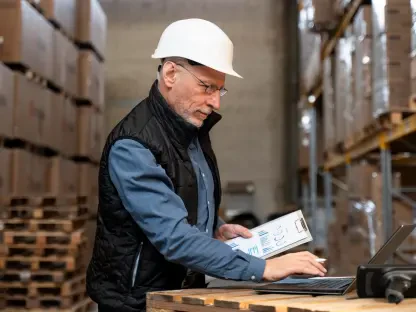Imagine a bustling financial district in the heart of Riyadh, where thousands of workers and visitors navigate a compact urban space with ease, thanks to a cutting-edge monorail system that slashes travel times and curbs carbon emissions. This is the promise of the King Abdullah Financial District (KAFD) Transit System, a 3.6-kilometer elevated monorail designed to transform connectivity. With Egis, a global engineering and consulting firm, appointed as the Site Supervision Consultant, the project has sparked widespread discussion among industry experts, urban planners, and sustainability advocates. This roundup gathers diverse perspectives on how Egis’s involvement could shape the monorail’s role in redefining urban mobility, aligning with Saudi Arabia’s Vision 2030, and setting a precedent for future transit initiatives.
Setting the Context: KAFD Monorail and Egis’s Crucial Involvement
The KAFD Transit System aims to revolutionize movement within Riyadh’s premier financial hub by connecting six stations through a one-way loop, seamlessly integrated with public buildings and pedestrian skywalks. Experts in urban development highlight the monorail’s potential to serve as a backbone for efficient transport, linking to the broader Riyadh Metro network. Egis’s role as supervisor of construction and systems integration has drawn attention for its promise to ensure precision in execution.
Industry observers note that the project’s alignment with national goals for sustainable growth makes it a flagship initiative. Many point out that Egis’s expertise, built on previous large-scale projects in the region, positions it to address the unique challenges of this endeavor. Discussions often center on how such a focused transit solution could inspire other cities to rethink urban planning.
A recurring theme among commentators is the monorail’s capacity to reduce reliance on private vehicles, a critical step toward environmental goals. Some urban planners emphasize that this system could become a case study for balancing economic progress with ecological responsibility. Their insights suggest a shared optimism about the transformative potential under Egis’s guidance.
Diverse Perspectives on Egis’s Role in KAFD’s Transit Goals
Precision in Oversight: Managing Complex Construction
Construction specialists commend Egis’s comprehensive approach to supervising the monorail’s civil works, rolling stock, and electrical systems. Their consensus is that such meticulous oversight is vital for maintaining quality across all project phases. Many draw parallels with Egis’s successful management of previous metro developments in Riyadh, viewing it as evidence of capability.
However, some engineers caution that tight timelines and the integration of the monorail with existing infrastructure pose significant hurdles. They argue that Egis must navigate stakeholder expectations while ensuring minimal disruption to the district’s operations. This perspective underscores the complexity of delivering a project of this scale in a live urban environment.
A contrasting view from project management consultants suggests that these challenges are surmountable with robust planning. They advocate for leveraging advanced scheduling tools and real-time monitoring to stay on track. This diversity in opinion highlights the multifaceted nature of Egis’s supervisory responsibilities.
Sustainability at the Core: Promoting Green Transport
Environmental advocates praise the KAFD monorail for its alignment with Saudi Arabia’s push to lower carbon footprints through public transport. They argue that shifting commuters away from cars could significantly cut emissions in a densely populated district. This viewpoint reflects a broader hope for scalable green solutions.
Urban designers add that the system’s design, enabling a “10-minute city” concept, offers practical benefits by ensuring quick access across KAFD. They believe this could enhance livability for workers and visitors alike. Yet, some note that high initial costs remain a concern, potentially impacting long-term funding.
A more cautious stance comes from policy analysts who stress the importance of public adoption for the project’s success. They suggest that without sustained ridership, environmental gains might fall short of expectations. This mix of optimism and pragmatism shapes the sustainability debate surrounding the monorail.
Vision 2030 Alignment: Reflecting Modern Rail Trends
Rail industry experts see the KAFD project as part of a larger wave of infrastructure modernization in Saudi Arabia, alongside expansions like the Riyadh Metro and high-speed rail initiatives. They note that such developments signal a commitment to advanced transit under Vision 2030. International partnerships, often cited in discussions, are viewed as key to this progress.
Some technology consultants emphasize the growing reliance on global collaborations to bring cutting-edge solutions to the Kingdom’s rail systems. They point to the integration of innovative designs as a way to stay ahead of urban mobility trends. This perspective highlights a forward-looking approach to infrastructure.
On the other hand, a few urban planning scholars question whether compact systems like KAFD’s monorail can truly redefine city layouts in the Gulf region. They argue that traditional sprawl-centric models might resist such compact innovations. This divergence in thought adds depth to the conversation about long-term urban impacts.
User-Centric Focus: Designing for Accessibility
Architects and designers laud the monorail’s integration with pedestrian skywalks and public spaces, noting that it prioritizes convenience for a diverse user base. They believe this focus on accessibility could set a new standard for transit projects. Such designs are often seen as enhancing the daily experience of KAFD’s occupants.
Some mobility experts speculate that operational efficiency and thoughtful design could influence future regional projects. They suggest that lessons learned here might apply to other financial hubs seeking integrated transport. This optimism is tempered by calls for continuous user feedback to refine the system.
Comparatively, a few global transit analysts contrast KAFD’s approach with other monorail systems worldwide, arguing that its emphasis on user experience stands out. They point to the tailored connectivity as a unique strength. This comparison fuels discussions on what makes this project a potential benchmark.
Key Takeaways from Varied Insights on Egis’s Contribution
Commentators across fields agree that Egis’s supervision is pivotal in meeting the KAFD monorail’s goals of sustainability, connectivity, and efficiency. Their collective view underscores the firm’s role in ensuring the project aligns with Riyadh’s growth trajectory. This consensus reflects confidence in structured oversight.
Urban planners suggest that other financial districts could replicate this model by prioritizing integrated transit systems. They advocate for early collaboration between consultants and local authorities to mirror KAFD’s approach. Such practical advice emerges as a valuable lesson from the ongoing discourse.
Additionally, policy experts recommend that stakeholders tap into Egis’s expertise to tackle common urban mobility challenges. They propose fostering public-private partnerships to share risks and resources effectively. These actionable ideas provide a roadmap for addressing systemic transport issues.
Reflecting on the Broader Implications of KAFD’s Mobility Framework
Looking back, the KAFD monorail project, guided by Egis, stood as a significant milestone in Saudi Arabia’s journey toward sustainable urban development. It encapsulated a national commitment to innovative transport solutions that balanced economic needs with environmental care. The diverse opinions gathered revealed a shared belief in its potential to influence regional trends.
Moving forward, stakeholders could consider investing in public awareness campaigns to boost ridership and maximize the system’s impact. Exploring scalable technologies from this initiative might also offer solutions for other cities facing similar challenges. These steps could ensure that the lessons from KAFD resonate far beyond Riyadh’s borders.









